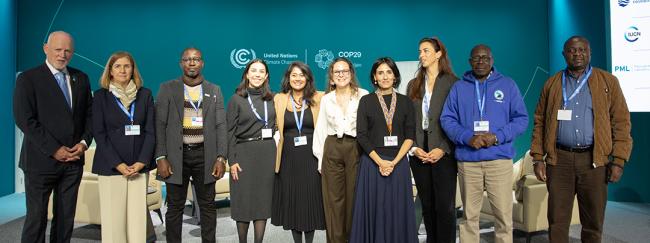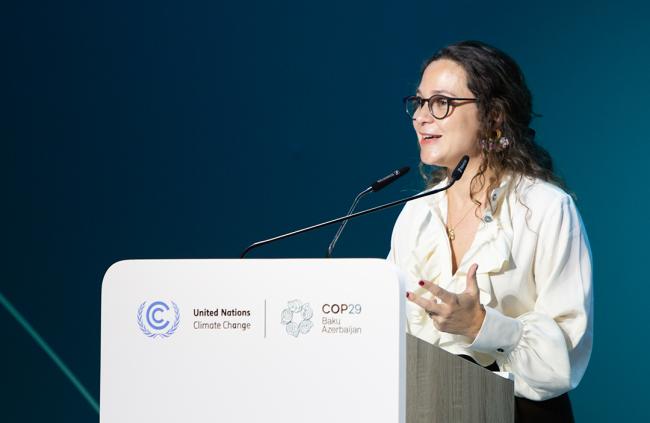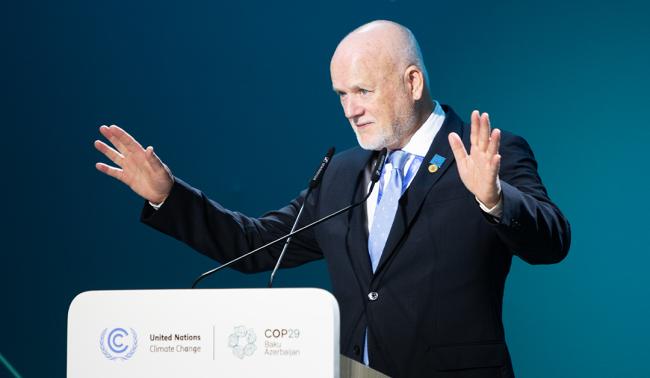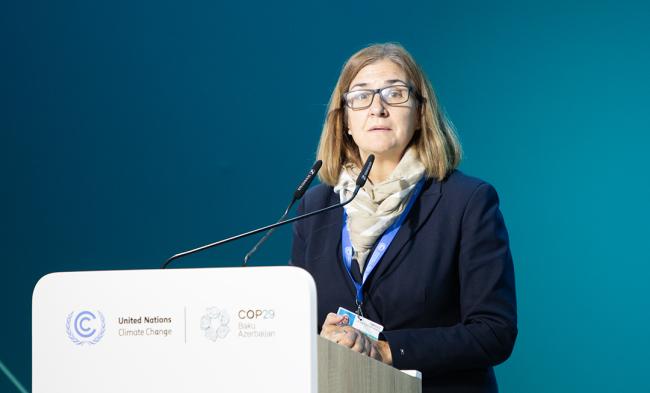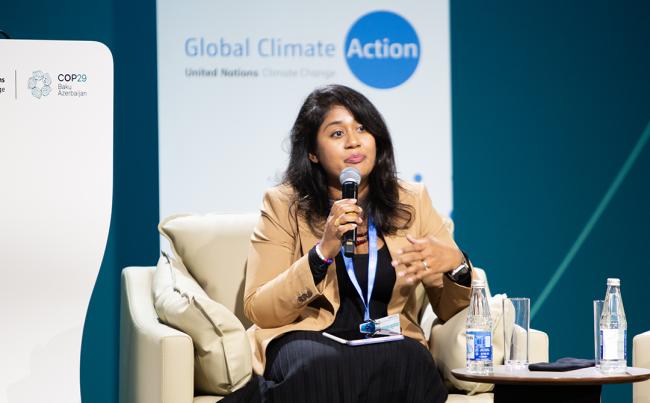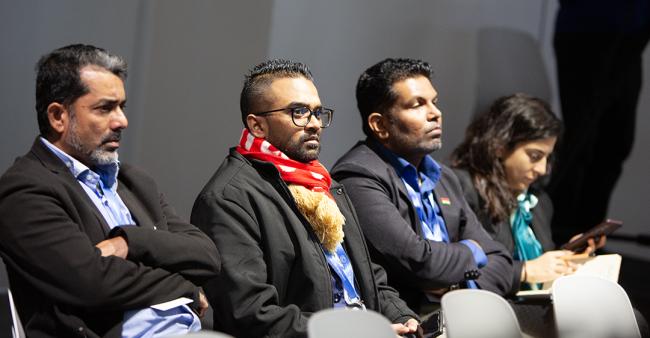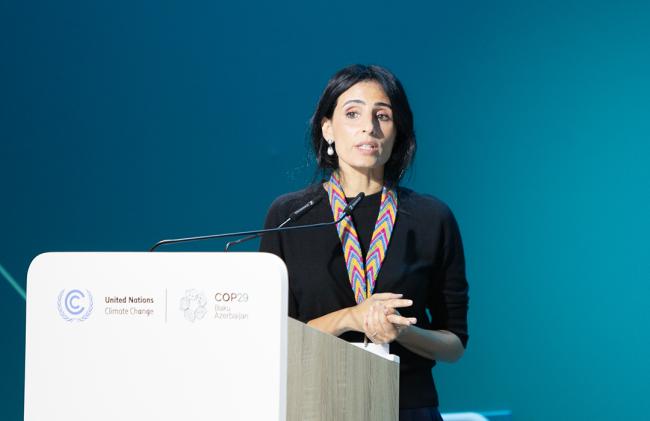Launched ahead of COP 28, the Ocean Breakthroughs are transformative pathways covering five key ocean sectors, where accelerated action and investments could deliver up to 35% emission reductions. This event, taking place on Oceans and Coastal Zones Day, saw, among others, the launch of the Coastal Tourism Breakthrough and showcased progress and growing support to Breakthroughs in four other key Ocean sectors.
Moderator Loreley Picourt, Executive Director, Ocean & Climate Platform, opened the event by emphasizing the critical interconnection between the Ocean and climate. She stated “Ocean action is climate action,” but highlighted the importance of aligning financial priorities with this understanding. With COP 29 focusing on finance, she stressed, “We now also have to ensure that ocean finance is climate finance,” namely that the Ocean is part of the solution to achieve the objectives of the Paris Agreement and, as such, it must be included as part of climate finance.
Peter Thomson, UN Secretary-General’s Special Envoy for the Ocean, then delivered keynote remarks, calling for delegates to recognize the importance of the annual Ocean and Climate Change Dialogue, co-chaired in 2024 by Canada and Chile, in a “crowded international agenda.” He emphasized the critical need for decarbonization, highlighting the devastating impacts of emissions on the Ocean, including the destruction of coral reefs that support 24% of marine life. Responding with a confident “yes” to whether humanity can “go cold turkey” on fossil fuels, Thomson celebrated the incremental progress achieved in integrating ocean action into the climate agenda, particularly over the last three COPs.
A first panel moderated by Erika Harms, Iberostar, focused on the launch of the Coastal Tourism Breakthrough. Harms explained this Breakthrough shows commitment by the tourism industry, one of the fastest growing industries in the world, to support halving emissions by investing at least USD 30 billion into the sector by 2030 and even more investments for need-based adaptation.
Julia Simpson, President and CEO, World Travel & Tourism Council (WTTC), cited data from recent research that found that tourism, a USD 3 trillion industry, is responsible for over 7% of emissions, and 50% of all tourism spending is in coastal locations. Thus, she concluded, because the industry “lives and depends” on coastal areas, it is incumbent on the industry to protect them. In response to a question about key drivers of environmental impacts and the financial needs to ensure protection, Simpson outlined the urgent need for investment and collaboration. She estimated that businesses should allocate 2-3% of their revenues, amounting to USD 65 billion annually, for critical initiatives such as mangrove protection and renewable energy development.
Ivan Cruz Burgos, Ministry of the Environment and Natural Resources, Dominican Republic, emphasized the significant local impacts of climate change, particularly on tourism, which accounts for 15% of the country’s GDP. He expressed gratitude for the collaboration in addressing these challenges and highlighted the dependency of the country's economy on its pristine white-sand beaches and rich biodiversity. He explained that Punta Cana, a key tourist destination with significant infrastructure, is also home to diverse ecosystems, including mangroves, which are vital for climate adaptation. To address these vulnerabilities, he said the Dominican Republic is actively working with the private sector and local communities to mitigate climate impacts and develop adaptive strategies.
Manuel Pulgar-Vidal, World Wild Fund for Nature (WWF), addressed the decarbonization of the tourism industry, emphasizing the need to better integrate the ocean agenda into broader climate and biodiversity frameworks while fostering synergies. He highlighted the importance of connecting tourism with coastal and ocean conservation, urging stronger alignment with National Adaptation Plans (NAPs). Pulgar-Vidal underscored tourism’s unique role as a “convener” capable of bringing together diverse stakeholders and raising awareness and as a “connector” that can influence multiple sectors at once. He commended the impact of the Marrakech Partnership for Global Climate Action in fostering the engagement of non-state actors in the process and advocated for greater efforts to “break down silos” to enhance collaboration and integration across sectors.
In a second panel, speakers provided updates on the Ocean Breakthroughs across sectors. On energy, Shamini Selvaratnam, Ocean Conservancy, described collaboration with the Global Offshore Wind Alliance, which seeks to ensure that the move to offshore wind is done in a way that protects biodiversity, and pointed to the Guidance Tool to Integrate Responsible Offshore Wind into Nationally Determined Contributions as a useful development that is designed to provide succinct, user-friendly guidance for decision-makers.
On shipping, Tatiana Antonelli, Founder and Managing Director, Goumbook, announced the 2030 Marine Biodiversity and Ocean Health Breakthrough and Roadmap, which was developed from the report Navigating the Future: Bridging Shipping, Biodiversity and Decarbonisation. Launched at COP 28, she said it creates a shared vision for climate and nature across all stakeholders in the sector.
On conservation, Dwight Z.K. Sheriff, Ministry of the Environment and Climate Change, Sierra Leone, said Sierra Leone was the first African nation to endorse the Mangrove Breakthrough NDC Taskforce, launched by the Global Mangrove Alliance. Its objective, he said, is to help countries develop mangrove-positive climate commitments in their national climate mitigation and adaptation plans. In Sierra Leone, he explained, 1% of those mangroves are lost each year, and restoration efforts have been aimed at halting and reversing this loss.
On food, Gabriel Muswali, East Africa Platform of Non State Actors in Fisheries and Aquaculture Sector (EARFISH), emphasized that the Ocean is not only a victim of climate change but also a solution. He highlighted East Africa's abundant fishery resources, vital for addressing malnutrition and poverty among its 400 million people. Muswali called for amplifying the role of aquatic food systems in climate finance, noting their low carbon footprint and contributions to various Sustainable Development Goals (SDGs). He urged governments to prioritize aquatic food systems and build bridges to secure climate funding.
In concluding remarks, Razan Al Mubarak, UN High Level Climate Champion for COP 28, pointed to progress since the Ocean Breakthroughs were introduced at COP 28, emphasizing their recognition in negotiated texts as key to achieving the goals of the Paris Agreement. Stressing the need to integrate blue nature-based solutions into NDCs, she urged collective action across sectors to fast-track ocean-based solutions, connecting climate and biodiversity goals. “Let us mainstream this agenda together,” she concluded.
Organizer: Ocean & Climate Platform, on behalf of the Marrakech Partnership on Oceans and Coastal Zones and the High-Level Climate Champions
Contact: Cyrielle Lam | cylam@ocean-climate.org
Website: https://www.ocean-climate.org/
To receive free coverage of global environmental events delivered to your inbox, subscribe to the ENB Update newsletter.
All ENB photos are free to use with attribution. For 2024 UN Climate Change Conference Baku - Side Events , please use: Photo by IISD/ENB | Angeles Estrada Vigil

